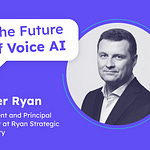In The Future of Voice AI series of interviews, Davit asks three questions to his guests:
- What problems do you currently see in Enterprise Voice AI?
- How does your company solve these problems?
- What solutions do you envision in the next 5 years?This episode’s guest is Steve Morrell, Managing Director at ContactBabel.
Steve Morrell is the Managing Director of ContactBabel. He has written hundreds of research reports and his opinion on the contact centre industry has been featured on the BBC, ITV, Sky, the Guardian, Forbes.com and the Financial Times. He has also advised the UK government on the effect of offshoring on the UK economy.
ContactBabel is a trusted provider of high-quality market research to the UK and US contact centre industries. Founded in 2001, they provide real knowledge and insight through our large-scale, ongoing primary research programme, producing insight into all areas of the contact centre industry: technology, HR and operational benchmarking. For contact centres, they provide free industry research around technology challenges such as omnichannel, AI, self-service and cloud; HR issues such as attrition, absence and salaries; and operational and performance benchmarking statistics. For contact centre solution providers, they offer market sizing and forecasts, as well as real assistance in communicating and delivering marketing messages directly to their key audience.
Recap Video
Summary
Voice Channel Dominance: Steve highlights the enduring significance of voice communication, debunking predictions of its decline. He notes that despite increased digital investment, voice remains the preferred channel for 65% of customer interactions due to its efficiency in achieving first contact resolution and reducing customer effort.
Challenges of Queue Times and First Contact Resolution: Steve points out that despite voice's advantages, challenges such as unpredictable queue times negatively impact customer experience, emphasizing the importance of managing these aspects to maintain customer satisfaction.
The Role of Average Handling Time: Contrary to diminishing emphasis on average handling time (AHT) due to a shift towards customer experience metrics, Steve argues for its importance. He illustrates how AHT directly affects queue times, call abandonment rates, and subsequently, customer satisfaction and NPS scores, advocating for a balanced approach that doesn’t compromise customer service.
Advancements in IVR: Discussing the integration of voice AI in IVR systems, Steve acknowledges the potential of voice bots to improve self-service by understanding complex requests and reducing reliance on extensive menu systems. He stresses the importance of gradual adoption to build customer trust and acceptance.
Future of Agent-Assist vs Voice Bots: Steve envisions a complementary future where sophisticated forms of self-service through voice bots coexist with the necessity for live agent interaction. He advises on adopting AI in manageable increments, focusing on specific, measurable use cases to ensure effectiveness and customer acceptance.
Post-Call Automation: Highlighting the potential for AI in post-call processes, Steve suggests the use of generative AI for summarization and back-office tasks. This can lead to significant efficiency gains and cost savings by reducing the time agents spend on after-call work, thereby improving overall service speed and customer satisfaction.
Takeaways
Endurance of Voice as a Preferred Channel: Despite the rise of digital platforms, voice remains the dominant channel for customer interactions, valued for its ability to facilitate first contact resolution and minimize customer effort.
Importance of Managing Queue Times: Steve emphasizes the critical impact of queue times on customer satisfaction, highlighting that addressing this issue is key to improving the overall customer experience.
Reassessment of Average Handling Time (AHT): Contrary to its decreasing significance in measuring contact center success, AHT directly influences other critical metrics such as queue times and customer satisfaction, necessitating a balanced approach to its management.
Advancements in IVR Systems: The integration of voice AI in IVR systems is recognized for its potential to enhance self-service options, making interactions more efficient and reducing the need for extensive menu navigation.
Gradual Adoption of AI: Steve advocates for a cautious, step-by-step approach to adopting AI in customer interactions to ensure effectiveness and maintain customer trust.
Potential of Post-Call Automation: Highlighting an area ripe for innovation, Steve points to the significant savings and efficiency gains possible through AI-assisted summarization and backend task automation following customer calls.











